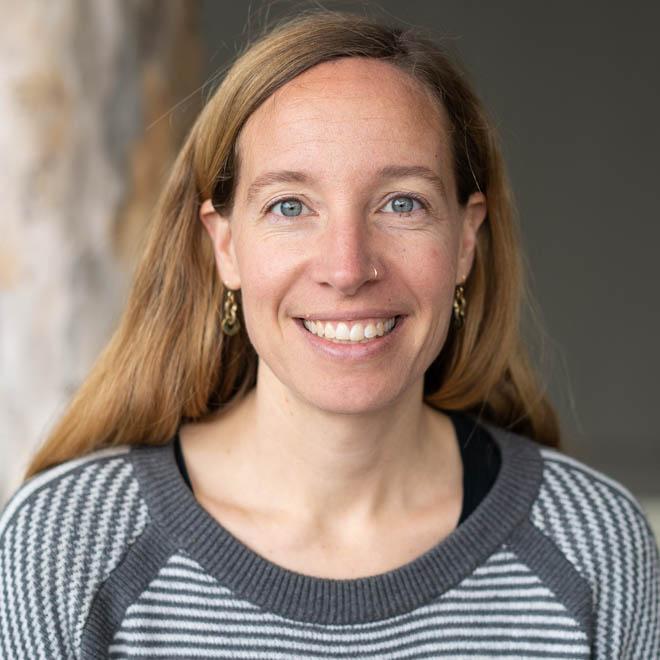Lydia Vaughn
Lydia Smith Vaughn, PhD
Senior Environmental Scientist
Resilient Landscapes Program
Carbon, Ecosystems & Climate
Delta Science & Management
Terrestrial Ecology
5107467367
Lydia Smith Vaughn is a senior scientist in the Resilient Landscapes program at SFEI, where she works on projects related to ecosystem carbon storage and greenhouse gas dynamics. With a background in soil biogeochemistry, she is particularly interested in how we can manage ecosystems for carbon storage in ecologically thoughtful ways. Lydia received her M.S. and Ph.D. from the Energy and Resources Group at UC Berkeley. There, her research had two primary focus areas: the dynamics and climate-vulnerability of Arctic soil carbon, and ecological considerations for land-based carbon sequestration strategies. Before coming to SFEI, she conducted postdoctoral research in UC Berkeley’s Integrative Biology department, where she studied dry-season soil carbon dynamics at the Eel River Critical Zone Observatory.
Related Projects, News, and Events
 State of Our Estuary (Project)
State of Our Estuary (Project)
The State of Our Estuary (formerly the State of the Estuary Report) evaluates the status and trends of a suite of indicators selected to represent ecosystem health in the San Francisco Bay and Sacramento-San Joaquin River Delta (the Estuary).
 Sediment Solutions (Project)
Sediment Solutions (Project)
Sediment Solutions is a timely and innovative project that builds on SFEI’s past work, operationalizing cutting-edge science to inform management approaches that take advantage of natural processes to provide more creek sediment to baylands, increase climate resilience, and enhance creek health. With study areas in North Bay, East Bay, and South Bay, the project will provide new guidance for management strategies that support flood risk management and ecosystem health benefits throughout the region.
 Delta Wetlands and Resilience: Blue Carbon and Marsh Accretion (Project)
Delta Wetlands and Resilience: Blue Carbon and Marsh Accretion (Project)
Restoring wetlands in the Sacramento-San Joaquin Delta (Delta) can mitigate subsidence, sequester carbon, reduce GHG emissions, and provide habitat for wetland dependent species. These benefits–their magnitude, scope, and resilience to future sea level rise–depend on the type and siting of new wetlands; rates of carbon accumulation, GHG emissions, and vertical accretion; and opportunities for wetlands to migrate upslope.
 Vision from the Skies: Using UAS Surveys to Monitor a Key Restoration Project (News)
Vision from the Skies: Using UAS Surveys to Monitor a Key Restoration Project (News)
At the McCosker Creek Restoration site, 3,000 linear feet of creek channel that previously had been flowing through underground culverts since the 1950s was daylighted and reconstructed. In addition, invasive and non native plants were removed and replaced with over 5,000 native plants. The restoration was also designed to support erosion control, and provide habitat for wildlife and aquatic species including rainbow trout, California red-legged frog and the Alameda whipsnake. This restoration work began in 2020 and concluded in 2023.
 Suisun Landscapes (Project)
Suisun Landscapes (Project)
The largest brackish marsh on the West Coast, Suisun Marsh is a unique transitional landscape between San Francisco Bay and the Sacramento-San Joaquin Delta. The Marsh supports high ecological diversity and has long been managed for recreational hunting and native species support, yet it is threatened by an uncertain future under climate change. Effective adaptation in Suisun will require coordinated, science-based planning by agencies and private landowners.
 Managing Open Space in Support of Net Zero (Project)
Managing Open Space in Support of Net Zero (Project)
Protecting carbon stocks and increasing carbon sequestration can support climate change mitigation and maintain healthy, resilient ecosystems. To support SFPUC managers in making informed carbon management decisions, the Alameda Watershed Carbon Assessment offers scientific guidance on the watershed’s current and potential performance as a natural climate solution. This assessment was framed by two main objectives: to quantify current carbon stocks in the Alameda Watershed, and to evaluate opportunities to enhance carbon sequestration in its vegetation and soils.
 Blue Carbon Science to Support Climate Action (Project)
Blue Carbon Science to Support Climate Action (Project)
Working with other scientists, agency staff, and regional and state-level managers and planners, we are building alignment and capacity for blue carbon quantification through science synthesis, outreach, and mapping.
 Landscape Scenario Planning Tool (Project)
Landscape Scenario Planning Tool (Project)
This project is a tool for planning scenarios of landscape-scale restoration. The tool is designed to inform ongoing and future restoration planning efforts. In particular, this tool will help inform implementation of restoration objectives as described in the Delta Plan, as well as the ongoing Ecosystem Amendment to Chapter 4.
In partnership with the Delta Stewardship Council, the San Francisco Estuary Institute has developed version 2.0 of the Landscape Scenario Planning Tool, a GIS-based analysis toolkit to evaluate user-designed land use and restoration scenarios for the Sacramento-San Joaquin Delta and Suisun Marsh. This free mapping toolbox brings together ten years of science-based research and peer-reviewed methods for California’s Delta-Suisun region.
 Peninsula Watershed Historical Ecology Study (Project)
Peninsula Watershed Historical Ecology Study (Project)
Nestled in the rugged coastal mountains between San Francisco and Silicon Valley lies one of the ecological treasures of the San Francisco Bay Area: the Peninsula Watershed. Home to mountain lions, marbled murrelets, towering old-growth Douglas-firs, and an immense diversity of other plants and animals, the Peninsula Watershed is a unique and wild expanse of open space just minutes from one of the most urbanized parts of California.

